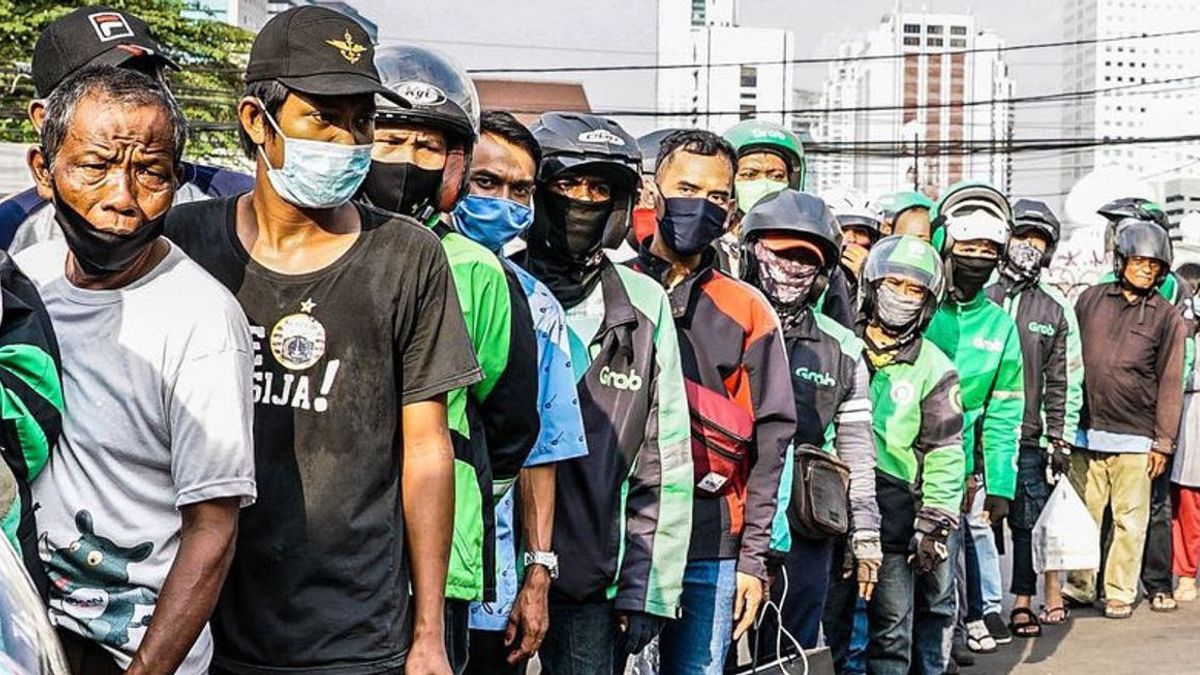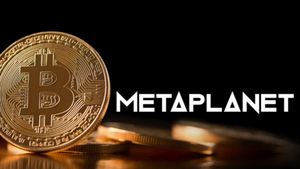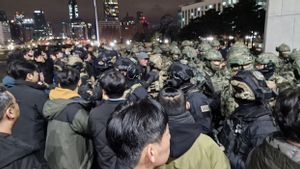JAKARTA - Rich people call for prokes. The poor screamed hungry. Influencer, Ian Hugen creates slanderous content, asking the poor to work. The House of Representatives (DPR) is preparing an independent isolation facility (isoman) in a three-star hotel. All these events awaken our awareness of the boundaries of social class.
"Heh, lazy. Get up now. Work. Make money. You're not Rafathar. You're poor. Work, work. Get up now. Work!" Ian Hugen scoffs at the video content he uploads to TikTok. The video later went viral on Twitter, with many people criticizing his stance. Most commented on Ian Hugen's insensitivity to the social conditions of the lower classes today.
"Content like this does not provoke enthusiasm, it provokes emotions. Poor people have been scolded by people with money for a long time. They are said to be lazy because they are poor. After all, who wants to be poor anyway. Rich people know how hard it is to find a job, apply here and there waiting for a call. ," wrote the account @species_langkaa.
Help me find a job, ci @ianhugen, many of my friends are unemployed after being cut, want to work but can't find them, have sent them here and there.
— (@alpokatmentega) July 27, 2021
The netizens' comments are supported by facts on the ground. Indeed, it only takes a little reading of the news to know having a job is a special occasion today. The impact of the COVID-19 pandemic has put great pressure on the employment sector in the world, including Indonesia.
Last May, the Minister of National Development Planning/National Development Planning Agency (PPN/Bappenas) Suharso Monoarfa explained that in the August 2020 period, there were at least 29 million working-age people affected by COVID-19. The unemployment rate increased to 7.07 percent from the 138.22 million workforce. That is equivalent to 9.77 million working age.
"This means that 9.77 million people are unemployed," said Soeharso at the Reports on Indonesia's Occupational Employment Outlook 2020 (IOEO) and Indonesia's Occupational Tasks and Skills 2020 (IndoTaSk).

While many unemployed and poor were sprayed by Ian Hugen, DPR politicians showed shameless egoism. The Secretariat General of the DPR is reportedly preparing a three-star hotel for quarantine facilities for DPR members who have been exposed to OVID-19 with mild symptoms and OTG.
"Yes (members of the DPR) including staff, civil servants, without family," said DPR Secretary General Indra Iskandar to reporters, Tuesday, July 27.
Indra said previously the isolation facilities were provided at the DPR's official residence complex in Kalibata. However, there are complaints so it is provided at the hotel. "So this is how the intensity of council members is very high in their interaction constituents. So the potential for exposure is high," said Indra.
The procurement of hotel facilities, said Indra, was in accordance with existing regulations, namely the Letters of the Director General of State Treasury S-369/PB/2020 and S-308/PB/2020. The budget for the facility, said Indra, was taken from the unused state budget. The Indonesian Parliamentary Concerned Community Forum (Formappi) criticized.
"The provision of special facilities for members of the DPR tends to show the face of parliament that does not care, is not sensitive, does not have empathy," said Formappi researcher Lucius Karus, Wednesday, July 28.
Awakening class consciousness kesadaran
Sociologist Universitas Airlangga (UNAIR) Surabaya, Bagong Suyanto said the pandemic did show class differences more clearly. And the structure is now increasingly disaggregated, namely established and vulnerable.
"Many of the middle class have now dropped their status to join the poor," he told VOI, Wednesday, July 28.
This clearer class boundary appearance makes the sensitivity between classes also increase. Everyone assumes each other, as soon as Bagong sees a situation that often creates friction.
And it cannot be denied let alone avoided. Denying the reality of class boundaries will only foster conflict that becomes a ticking time bomb. Recognizing the existence of class boundaries so it is necessary to know how to behave.
People from the upper classes should cultivate empathy. Not bullshit. Empathy, although not easy, is a way to deal with friction between classes. But empathy, after all, is the monopoly of the upper class.
"The key is empathy. If there is no empathy the conflict will be explosive ... For the lower class, surrender. Not empathy," said Bagong.
Privilege, real or myth?If a thing is real or not, it is determined by scientific theory, then privilege is real. Sociologist UIN Syarif Hidayatullah Jakarta, Tantan Hermansyah explained a theory that explains privilege as a result of interaction between subjects (individuals) which then have functions in the relationship between these subjects.
"For example, in an organization. The group is individuals who agree. When the agreement gets bigger, what we call society appears. In practice, society is a collection of individuals. They are bound by rules," said Tantan, quoted from the WRITING article SERIES entitled The Gray Crown Named Privilege.
Referring to the concept of agreement, privilege is actually a very vague concept. Its formation is very dependent on the agreement of individual groups (society). For example, an organization specializing in women will be driven home if the event is late.
This is a privilege for women. Privilege in the form of protection. In other words, even in the simplest context, privilege is a real thing. "The basis of privilege can vary, depending on what is agreed in the relationship," added Tantan.

Another example of how relative privilege is Tantan describes in another analogy. About how a professor who is highly respected in an academic environment, for example. When shopping in the market, he would be on par with even an immortal student. Thus, the existence of privilege is highly dependent on environmental conditions and situations.
Like it or not, privilege is a reality that an individual has to face as a social being. By understanding that, one will see the concept of privilege more clearly. A better way to live life, of course.
"Okay, I've only been able to do this to what I'm capable of," said psychologist Rosmini, quoted from the WRITING SERIES article entitled Redistribution of Wealth to Overcome Inequality in Social Privileges.
"If people want to try, nothing is impossible. It's just that most people often feel sorry for themselves so they take refuge with it, saying 'Others get benefits, while I don't,'" he said.
Saiful Mujani Research & Consulting (SMRC) researcher, Sadiman Ahmad, in his writings on the SMRC website describes economic inequality as a long-standing problem that plagues the narrative of justice and wealth distribution. According to Sadiman, this problem will bring social harm.
"Such as increasing crime, social instability, even obesity of citizens," he wrote.
Therefore, Sadiman argues, the way that the government can take to overcome inequality in the context of social privilege is to implement wealth redistribution. This scheme is commonly used in a democratic climate. However, there are parties who need to pay for the policy.
"Those who have to pay, of course, are the taxpayers, namely the rich class. The state must take some of the wealth of this upper class to distribute it to the lower classes through social program schemes," he said.
*Read other information about COVID-19 or read other interesting articles from Nailin In Saroh, Putri Ainur Islam, Ramdan Febrian, and Yudhistira Mahabharata.
Other BERNASThe English, Chinese, Japanese, Arabic, and French versions are automatically generated by the AI. So there may still be inaccuracies in translating, please always see Indonesian as our main language. (system supported by DigitalSiber.id)













